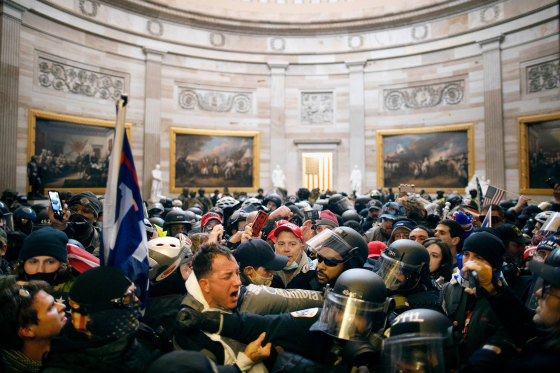WASHINGTON — The Supreme Court on Tuesday gave two men charged with offenses related to the Jan. 6, 2021, assault on the U.S. Capitol another chance to argue that they cannot face an obstruction charge in cases affected by a recent ruling by the justices.
The justices sent back to lower courts the cases involving Edward Lang and Garret Miller, who are seeking to dismiss a charge that they obstructed an official proceeding, specifically the certification by Congress of President Joe Biden’s election, which was disrupted by a mob of Trump supporters.
On Friday, the court ruled in a related case in favor of another Jan. 6 defendant, Joseph Fischer, concluding that the obstruction statute may not apply to his conduct. Lower courts will now determine whether Lang's and Miller's charges should be dismissed.
Lang “went to the Capitol to protest, was swept up in the violence of a crowd and the ensuing struggle with police officers, where he acted to defend himself and others from police violence,” his lawyers said in court papers. He is charged with four counts of assaulting a federal officer, among several other offenses. “1776 has commenced,” he wrote about Jan. 6, adding in all capital letters “give me liberty or give me death” and “this is only the beginning.” He also said he wanted to be arrested.
Lang has since said he is unrepentant for what happened on Jan. 6, and he called for former President Donald Trump’s help last year. “We are rotting in jail because we stood up for what you told us to stand up for!” Lang said.
Miller, accused of joining a crowd of rioters pushing against officers outside the Capitol and again in the Capitol Rotunda, faces similar charges, including one count of assaulting an officer. Miller also threatened Rep. Alexandria Ocasio-Cortez, D-N.Y., on social media, and he was arrested wearing an “I was there” Jan. 6 shirt.
In the Supreme Court case, the provision of the federal criminal code at issue was 18 U.S.C. 1512(c)(2), which criminalizes any effort to “corruptly” obstruct, influence or impede any official proceeding. Conviction can result in a prison sentence of up to 20 years.
The provision was enacted in 2002 as part of the Sarbanes-Oxley Act, a bill passed in the aftermath of the Enron accounting scandal. Defendants argued it was never intended to apply to an incident such as Jan. 6.
Trump was charged with the same obstruction offense in his election interference case in Washington. He could seek to use the Fischer ruling to his benefit in the hope that the charge could be dismissed.


